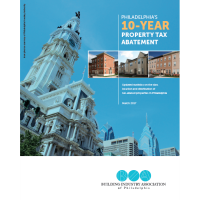Members-Only Information Center
YOUR BIA MEMBERSHIP GIVES YOU EXCLUSIVE ACCESS TO OUR ONLINE MEMBER INFORMATION CENTER.
Log in to learn about fellow members, update your profile, register for events, and much more. See below if you do not know your user name and password or need to create an account.
Member Login
BIA releases new report on the 10-year tax abatement
March 21, 2017

Since Philadelphia launched the 10-year tax abatement in 2000, many years of hard data are now available to assess its impact.
Late last year, BIA commissioned economist Kevin Gillen to research the size, location, distribution and other outcomes of the tax abatement program.
BIA’s new report, based on that research, clearly demonstrates that the tax abatement program is significantly increasing Philadelphia tax revenues and driving residential real estate at all price levels and throughout the city.
The report debunks several misconceptions about the abatement:
In short, the tax abatements are good for the homebuilding industry, good for Philadelphians and good for Philadelphia.
Read a summary of the BIA report here. Read the full report here.
Late last year, BIA commissioned economist Kevin Gillen to research the size, location, distribution and other outcomes of the tax abatement program.
BIA’s new report, based on that research, clearly demonstrates that the tax abatement program is significantly increasing Philadelphia tax revenues and driving residential real estate at all price levels and throughout the city.
The report debunks several misconceptions about the abatement:
- “The abatement plan only helps very wealthy buyers and developers.” In fact, only 2.8% of tax-abated residences have assessed values of $1 million or more. The typical tax abated property is a single-family home priced between $200,000 and $300,000.
- “The abatement only benefits Center City.” While the largest concentration of abated properties occurs in Center City, abated properties are dispersed throughout the city, with significant concentrations in South and West Philadelphia, Manayunk, Northern Liberties, Fishtown and Kensington.
- “The abatement takes revenue away from the city.” In fact, Philadelphia is currently realizing an additional $48.1 million in annual real estate tax revenues from properties with expired abatements. After all current abatements have expired in 2026, Philadelphia should realize an additional $169.4 million in annual real estate tax revenues in that year and every year afterwards.
In short, the tax abatements are good for the homebuilding industry, good for Philadelphians and good for Philadelphia.
Read a summary of the BIA report here. Read the full report here.

